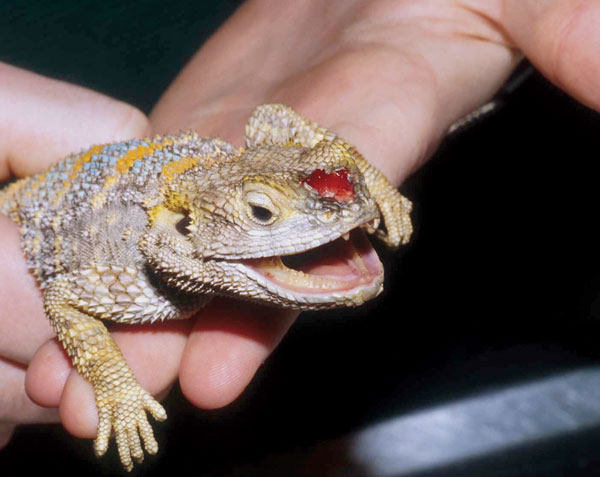It seems as though throughout my life I have lived in places where natural disasters are just a blink away. Whether it was California with the e
It seems as though throughout my life I have lived in places where natural disasters are just a blink away. Whether it was California with the earthquakes or the Florida Keys and the hurricanes, I always make it a point to be prepared. Preparation—generally in the form of emergency kits—can mean the difference between life and death.

Douglas R. Mader
Minor wounds like this rostral trauma in this clown agama can be treated with supplies in your first aid kit. For serious injuries, the herp should be taken to a veterinarian.
Emergency kits, whether they be for earthquakes, hurricanes, tornados, floods or fires, share a lot of commonalities. The basics, of course, such as food and water, are mandatory. A close third is an adequately supplied first aid kit.
I recommend you keep an emergency first aid kit for your reptile pets, too. And what should be in a herp first aid kit? A lot will depend on the types of herps that you keep, but there are some fundamentals that all kits should contain. Following is my comprehensive list.
Emergency Contact Info/Emergency Records
- Family veterinarian phone number
- Emergency veterinary hospital phone number
- Poison Control Hotline (800-426-4435)
- Emergency contact number for a friend or family member
- Animal records (husbandry and veterinary) for each pet. These don’t need to be in the kit, but, should always be readily available, especially if you have to evacuate.
Basic First Aid Supplies
- Gauze pads
- Sterile, non-stick gauze pads for bandaging
- Sterile saline flush (sold at pharmacies)
- Gauze rolls
- Adhesive tape (cloth and waterproof)
- Antiseptic wipes, soap or spray
- Cotton balls and swabs
- Hydrogen peroxide (check the date on the bottle; replace as necessary)
- Rubbing alcohol
- Disposable gloves
- Electronic thermometer
- Lubricating jelly
- Scissors
- Good tweezers or needlenose pliers (not old rusty ones!)
- A pillowcase (for temporary confinement)
- Electrolyte solution (e.g., Gatorade, Pedialyte)
- Powdered calorie supplement (several commercial brands for reptiles are available)
- Small, soft spatula (for opening mouths)
- Nail clippers
- Non-prescription antibiotic ointment (available at drug stores)
- Small flashlight
- Paper towels
- Plastic eyedropper or syringes
- Utility knife (such as a Swiss Army knife)
- Several large paperclips or popsicle sticks (to be used as splints)
- Styptic powder (clotting powder; available at pet and drug stores)
- Sharpie pen
General Guidelines
- Make it a habit to date everything that you put in the first aid kit.
- Check the kit at least twice per year and discard anything that is expired.
- Keep the kit out of reach of children.
- Don’t keep leftover or expired prescription medications in the kit.
- If your herp is on medication, make sure that you have at least a two-week backup supply in the kit.
- Medications should not be used on any animals other than the ones for which they were prescribed.
- Keep your kit somewhere handy and make sure that everybody in your house knows where it is.
Remember, first aid is intended to stabilize a sick or injured pet so that, if needed, it can be tended to by a medical professional. If you have an animal that is injured or severely ill, don’t waste time getting professional help. Administer first aid to stabilize your pet, and simultaneously plan transportation to the doctor, find a transport container, and get on the road. One of the biggest mistakes people make during a time of crisis is waiting too long. “Let’s just watch and see how it does,” could be the last words that pet hears.
In humans there is a distinction between first aid and cardio pulmonary resuscitation (CPR). It is possible to have training in the former and not the latter. The fundamental principles of CPR follow the simple A-B-C rule: A= Airway, B = Breathing and C = Circulation.
For our herp friends, providing CPR may be a bit difficult as specialized equipment is generally necessary to properly perform it. I do know of people who have administered mouth-to-mouth to their herps, but I do not recommend this, as it is extremely likely that you will transfer pathogens, such as Salmonella, from the animal to yourself if you put your mouth onto its mouth.
Never put yourself in harm’s way trying to help an injured herp (e.g., an alligator that has been hit by a car). Instead, call emergency personnel such as the police or fire department if needed.
I’ll close with some wise words from the American Red Cross: The three basic principles of first aid are build a kit, make a plan and be informed.
Douglas R. MADER, MS, DVM, DABVP (C/F, R/A), DECZM (HERPETOLOGY), is a graduate of the University of California, Davis. He owns the Marathon Veterinary Hospital in the Conch Republic, and is a world-renowned lecturer, author and editor. He sits on the review boards of several scientific and veterinary journals.


